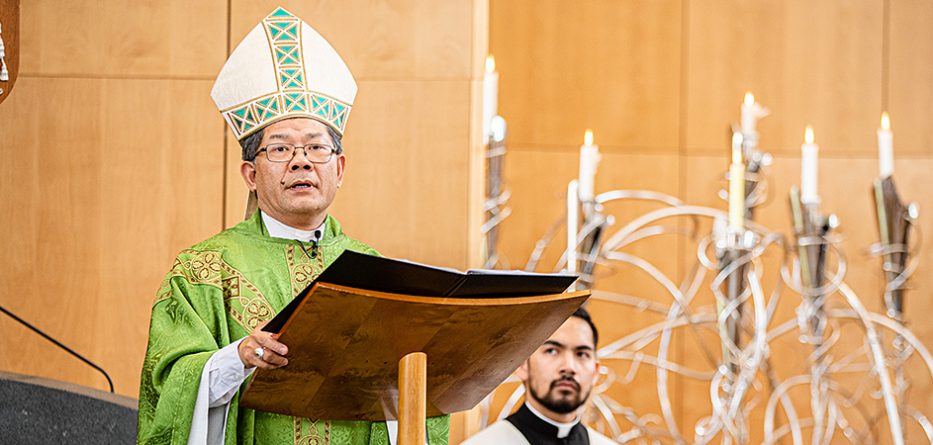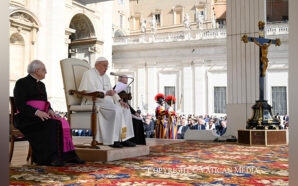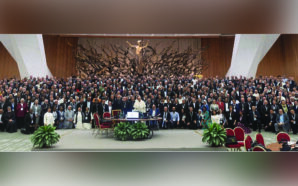Most Reverend Vincent Long Van Nguyen OFM Conv DD STL, Bishop of Parramatta
Homily for the 24th Sunday in Ordinary Time Year B 2021, 12 September 2021
Readings: Isaiah 50:5-9; James 2:14-18; Mark 8:27-35
12 September 2021
Following the Suffering Servant, not miracle worker
Brothers and sisters in Christ,
One of the lessons we learn from the pandemic is the sense of deep connection and solidarity. We realise that the bond of humanity binds us all together and we have a shared destiny. As Pope Francis says that we are not saved alone. This realisation demands a new framework of inclusion and communion as opposed to individualism and self-interest. Some parts of Australia might be COVID-free and enjoying more freedoms than the rest of us. However, we cannot thrive as a nation until we are all protected. This is also true universally. The Church has been advocating for fair distribution and access to vaccines for this very reason.
The Word of God this Sunday challenges us to move from the default model of power, dominion and self-preservation to the new Kingdom model of service, love and self-sacrifice. We are called to live the great paradox of the Gospel: life is lived fully not by surrendering it to self-survival instincts or the dominating powers. Life is fully lived when it can make a difference to others, that it can transform society and make it into a mirror of God’s kingdom.
In the first reading, Isaiah speaks about the future Messiah who would vindicate the faithful exiles and bring them back to their homeland. The prophet, however, describes this hero figure not in imperial model of power and dominance. In fact, it is more like an antihero. The Messiah is the one who “would make no resistance, who would not cover his face against insult and spittle”. Like Zechariah who foretells the king “riding on a donkey”, Isaiah goes against the grain of popular hopes and expectations. This prophecy subverts the script of the empire and points to God’s radical way of nonviolence, suffering and powerlessness.
In the Gospel, we also detect this subversion of conventional wisdom. It is the hard talk on the nature of Jesus’ saving mission and what it means to be his follower. The evangelist Mark has worked his narrative to this moment of truth. He has presented Jesus as the healer, the miracle worker, the teacher with authority. Here, half way to Jerusalem and in the town that bears the name of the Roman Emperor Caesare, the evangelist is at pains to tell us who Jesus is.
“Who do you say that I am?” is no ordinary question. In fact, it takes the audience back to the great “I am” revelation at the burning bush. It is to this question that Peter gives the answer: “You are the Christ”. It is the first time in the Gospel that we hear this proclamation. But lest it be misconstrued, Jesus is quick to qualify Peter’s confession. In fact, what follows flies in the face of popular expectations of the Messiah and challenges Peter to the core. He is rebuked and called a stumbling block because has distorted the mission of Jesus.
Peter has a steep learning curve on his way to be the foundation stone for the Christian community. Like Paul, Peter also has his pride and ambition checked. He learns to carry the cross as a discipleship of trust, powerlessness, vulnerability and self-sacrifice. He learns to be led to places he’d rather not go. This is not simply geography but above all a metaphor for vulnerable trust which is an essential quality for Christian living and witness.
It seems to me that the invitation to go to places that we’d rather not go is none other than the call to emulate the humble, powerless and vulnerable Christ. It is the call to live more fully, more boldly and more humbly at the periphery. This has been Pope Francis’ constant challenge to the Church. It is the Church that dares to do what Jesus did: to leave the security of its status, to accompany the most vulnerable, to minister at the liminal and precarious places, to empower all people to live life more fully.
We are custodians of the Good News. The Kingdom vision of Jesus guides us as we endeavour to be a community that serves as an antidote to the politics of fear, self-interest and the economy of exclusion in our world. We espouse a love that transcends borders and a social friendship that makes universal brotherhood possible. We are privileged to be partners with God’s plan for a shared destiny of hope, communion and life for all.
In the midst of the pandemic that has caused so much suffering and disruption, we ask ourselves where God is in this; we struggle to make sense of our Christian faith. Jesus today is presented not as a magician who could will the cross away. He is the suffering servant and a compassionate Messiah. May we have the courage to follow the example of Christ and live fully the demands of Christian discipleship. May we live the powerlessness and vulnerability of Jesus as a way to share with the suffering and to transform the world in accordance with his Kingdom vision.








